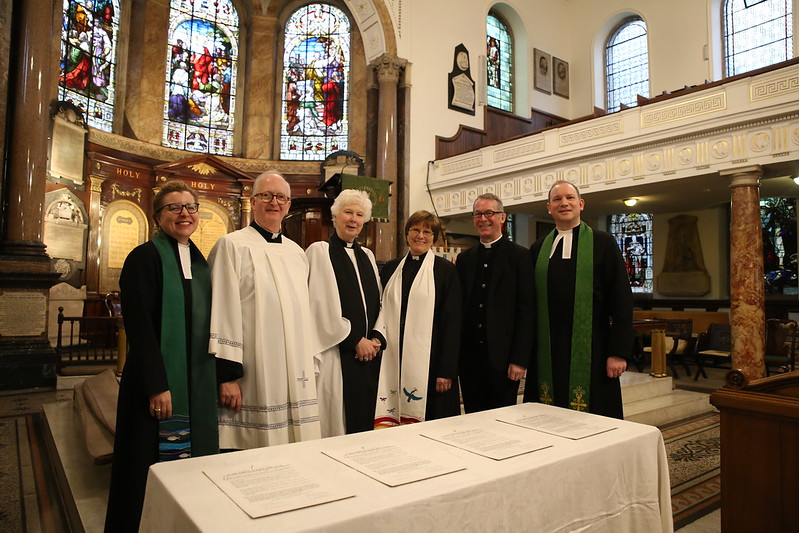By Martin Pendergast, Secretary, St Joseph’s Pastoral Council
What has happened to the energy of ecumenical commitment that marked so much of the Church’s life following the Second Vatican Council and the National Pastoral Congress of England and Wales in the 1980s? Well, an ecumenical winter might have frozen many parts of the Church, but not on the edge of the City of London.
St Joseph’s Catholic Church, Bunhill Row, close to the Barbican Centre and Old Street’s Silicon Roundabout holds ecumenical activity at the heart of its life and ministry. ‘Doing together what we do not need to do separately’ is not just an empty cliché. For over 15 years St Joseph’s has enjoyed the warmest of relationships with three local churches.
In 2002, the then priest-in-charge, Fr Bruno Healy, cemented relations with neighbouring churches by inviting clergy from St Giles’ Cripplegate Parish Church and the Methodist Wesley’s Chapel and Leysian Mission to take part in the dedication of a Quiet Garden in memory of Cardinal Basil Hume. St Joseph’s Church is also proud of two icons, in contemporary Ethiopian style, Joseph-of-the-House-of-David and Mary-Mother-of-the-City, by the renowned artist, Stéphane René. These were dedicated in an inter-faith celebration on 25th March 2005.
Before Fr Bruno was given permission to become a hermit, praying for the diocese, he ensured that an ecumenical witness was embodied in St Joseph’s Pastoral Council. For many years, St Joseph’s was probably the only Catholic Parish Council in the country to have a Methodist Minister as one of its members.
Times change, people move on, understandings develop and grow, but the spirit of fundamental unity is strengthened. The first of four ecumenical pilgrimages took place in January 2009 when over 40 Anglicans, Catholics, Lutherans, and Methodists, with local clergy including Canon Peter Newby, journeyed to Rome for the Year of St Paul. Later pilgrimages have been made to Latvia, led jointly by the first woman to serve as a Lutheran Bishop in the UK, JÄna JÄ“ruma-GrÄ«nberga, and local clergy colleagues. Pilgrimages have also taken place to Portugal and Spain, with a fifth pilgrimage to Oberammergau planned for October 2020.
Growth and nurturing in the common elements of Christian faith have been key elements in fostering our sense of unity, including a shared Anglican and Catholic weekend retreat at the Othona Community and sixth-century Chapel of St Cedd, on the Essex coast. Autumn and Lent programmes of reflection and discussion moving around Jewin Welsh Church, St Giles’ Cripplegate, St. Joseph’s, and Wesley’s Chapel, attract congregation members from across and beyond the local neighbourhoods. We gather again on the Saturdays in Lent, 7th to 28th March, to reflect on the Psalms, using a booklet by the Archbishop-elect of York Stephen Cottrell.
Mindful that the work for Christian unity is not simply a matter for clergy, and to ensure that the commitment is embedded within each church community so as to endure beyond the moves of church ministers, the four local churches signed an Ecumenical Partnership Agreement on 23rd January 2020 during the Week of Prayer for Christian Unity. Fr Chris Vipers signed it on behalf of St Joseph’s and a hand-inscribed copy will hang in each church. This will then be read out every year as a renewal of each church’s pledge ‘that all may be one’.
Bishop Nicholas Hudson, in a message for the unity service, said: ‘I am deeply encouraged to hear of this milestone event at Wesley’s Chapel. I know this agreement is the fruit of long years of friendship and partnership. You have grown together in your knowledge and love of the Lord Jesus, and it must surely be the Lord who has brought you to this day. To him be the glory today. As you gather, you might perhaps ask what the Lord is saying to you today, what word he waits for you to hear. In praying together, in sharing your stories, in searching the Word of God, and in your reaching out, listen out for him, and when you do, “Do not be afraid!” (Mt. 14:27).’




